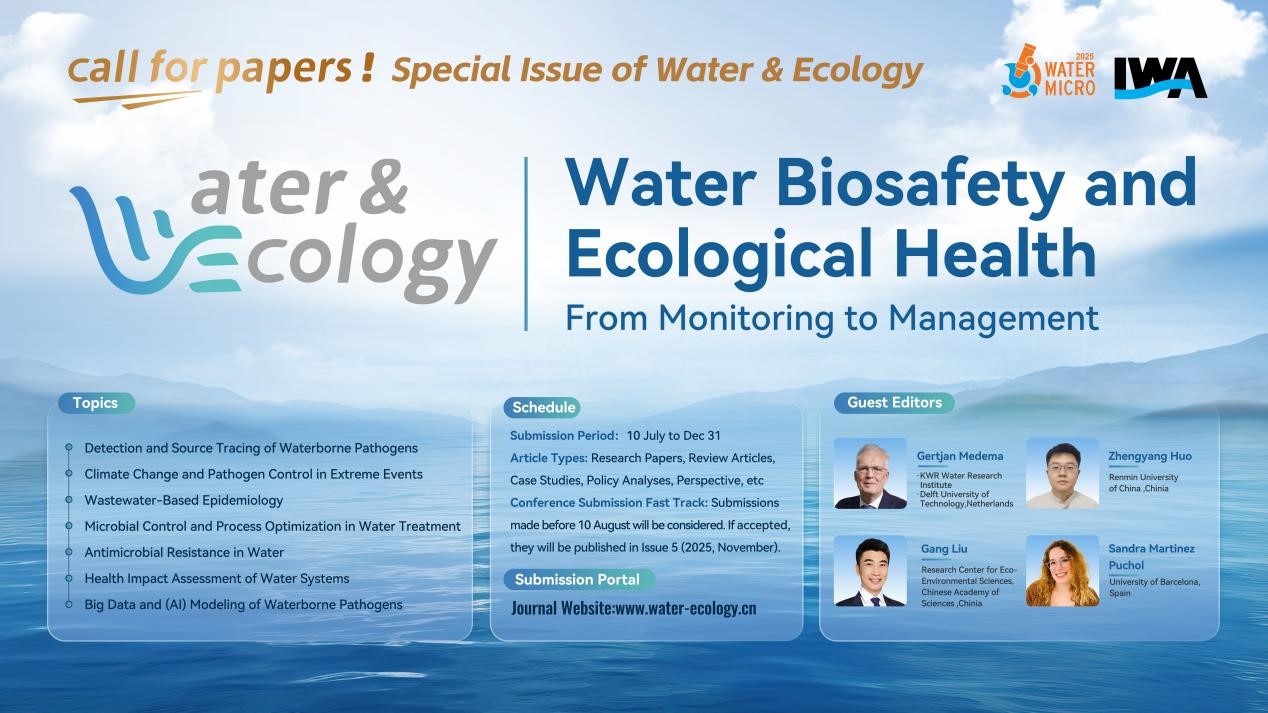Special Issue on Water Biosafety and Ecological Health: From Monitoring to Management
Published 18 July, 2025
In recent years, the global outbreak of viral pandemics and the occurrence of extreme disastrous weather have intensified the risk of spreading waterborne pathogens such as bacteria, viruses, and parasites. Traditional monitoring and management models are facing challenges such as inadequate timeliness and difficulties in source tracing. Breakthroughs in smart detection technologies, wastewater-based epidemiology, and microbial control technologies now offer innovative solutions for preventing and controlling public health risks in water environments.
On the occasion of the WaterMicro2025 conference, Professor Gertjan Medema, a member of the editorial board of Water & Ecology, and Assistant Editor-in-Chief Gang Liu, a researcher, jointly launched a special topic on “Water Biosafety and Ecological Health”. This initiative focuses on innovation in the whole chain of “detection-early warning-control-remediation” for waterborne pathogens, aiming to promote interdisciplinary integration and build safer water ecosystems. We also have invited two young scientists to be the guest editors, Zhengyang Huo from Renmin University and Sandra Martinez Puchol from the University of Barcelona.
Please join us, showcase your achievements, and contribute your expertise!
Gertjan Medema
KWR Water Research Institute; Delft University of Technology, Netherlands
Email: G.J.Medema@tudelft.nl
Gertjan Medema is Principal Microbiologist at KWR. He is also part-time professor of Water & Health at Delft University of Technology, and Distinguished Hannah Visiting Professor at Michigan State University. He is an internationally recognized expert and scientific coordinator of the WHO Collaborating Centre on Water Quality and Health. He advises WHO on the microbial safety of water, and the EU DG Environment on drinking water and water reuse guidelines. Gertjan is also a member of the IWA Strategic Council and of the Specialist Group on Health-Related Water Microbiology. His research focuses on understanding the transmission of infectious diseases and antimicrobial resistance via water systems, and how this can be prevented through technical and non-technical management measures. His research forms the scientific basis for the design of safe water systems, encompassing the development of methods for detection/typing/source tracking of pathogens and antimicrobial resistance, the observational, experimental and modelling research into the occurrence, fate and transport of pathogens and antimicrobial resistance in water systems, the typing and understanding of the removal of microorganisms by water treatment processes and so on.
Gang Liu
Research Center for Eco-Environmental Sciences, Chinese Academy of Sciences, China
Email: gliu@rcees.ac.cn
Liu Gang is a recipient of the National Science Fund for Distinguished Young Scholars, serving as the chief scientist for projects under China’s National Key Research and Development Program and deputy director of the Key Laboratory of Drinking Water Science and Technology at the Chinese Academy of Sciences. He chairs the China Committee on Water Microbial Security of the International Water Association (IWA) and serves as an expert for the United Nations Environment Programme (UNEP) World Water Quality Alliance and the UN Sustainable Development Goals (SDGs) Annual Progress Report. He leads over 20 R&D projects at home and abroad. His editorial roles include Executive Editor-in-Chief of Water & Ecology, Editorial Board Member of Engineering, Co-Editor-in-Chief of the IWA’s Water Science and Technology, and Managing Editor of Blue Green Systems. His research focuses on water system biosecurity, carbon-neutral urban development through urban water systems, and green sustainable water supply systems. He has published over 70 SCI papers, including more than 50 as first/corresponding author in prestigious journals such as Nature Water, National Science Review, Environmental Science and Technology, Water Research, and Engineering (as of December 2024).
Zhengyang Huo
Renmin University of China, China
Email: zhengyanghuo.edu@ruc.edu.cn
Zhengyang Huo is an Assistant Professor at Renmin University of China. He has been awarded the prestigious Marie Curie Fellowship from the European Commission and the Beijing Nova program. He received his B.S. degree in environmental science from Tongji University in 2014, and his Ph.D. degree in environmental engineering from Tsinghua University in 2019. Before joining RUC, he worked as a research professor at Sungkyunkwan University, funded by the Korea Research Fellowship. Dr. Huo’s research vision is to develop sustainable environmental applications for pathogen control. He has published 40 papers in leading international peer-reviewed journals, including first and corresponding author papers in Nature Water, Nature Reviews Clean Technology, Nature Communications, Science Advances, and Environmental Science & Technology, with >2100 citations and an H-index of 24. Dr. Huo has received funding from the Chinese National NSF Project and the Chinese National Key R&D Program. He is a Youth Editorial Board Member of The Innovation and Frontiers of Environmental Science & Engineering
Sandra Martinez Puchol
University of Barcelona, Spain
Email: smartinezpuchol@ub.edu
Sandra Martínez Puchol is a postdoctoral researcher and adjunct lecturer at the University of Barcelona, with a PhD in Biotechnology. Her work focuses on environmental virology, wastewater-based epidemiology, and the use of next-generation sequencing for public health surveillance. She has been actively involved in national and international research on virome dynamics, applying One Health approaches to monitor and mitigate viral threats at the human–animal–environment interface.

- Detection and source tracing of waterborne pathogens
- Climate change and pathogen control in extreme events
- Wastewater-based epidemiology
- Microbial control and process optimization in water treatment
- Antimicrobial resistance in water
- Health impact assessment of water system
- Big data and (AI) modeling of waterborne pathogens
Article Types
Research Papers, Review Articles, Case Studies, Policy Analyses, Perspective, etc.
Article Waiver %: 100%
Manuscript Submission Information
The journal’s submission platform (Editorial Manager®) is now available for receiving submissions to this Special Issue. Please refer to the Guide for Authors to prepare your manuscript, and select the article type of “VSI: Water Biosafety and Ecological Health” when submitting your manuscript online.
Submission System:
https://www.editorialmanager.com/wateco/default2.aspx
Guide for Authors:
https://www.sciengine.com/WE/authorCenter
Submission Period: July 10 to December 31, 2025
Fast Track for WaterMicro2025 Conference: Submissions made before August 10 will be considered. If accepted, they will be published in Issue 5 (November, 2025)